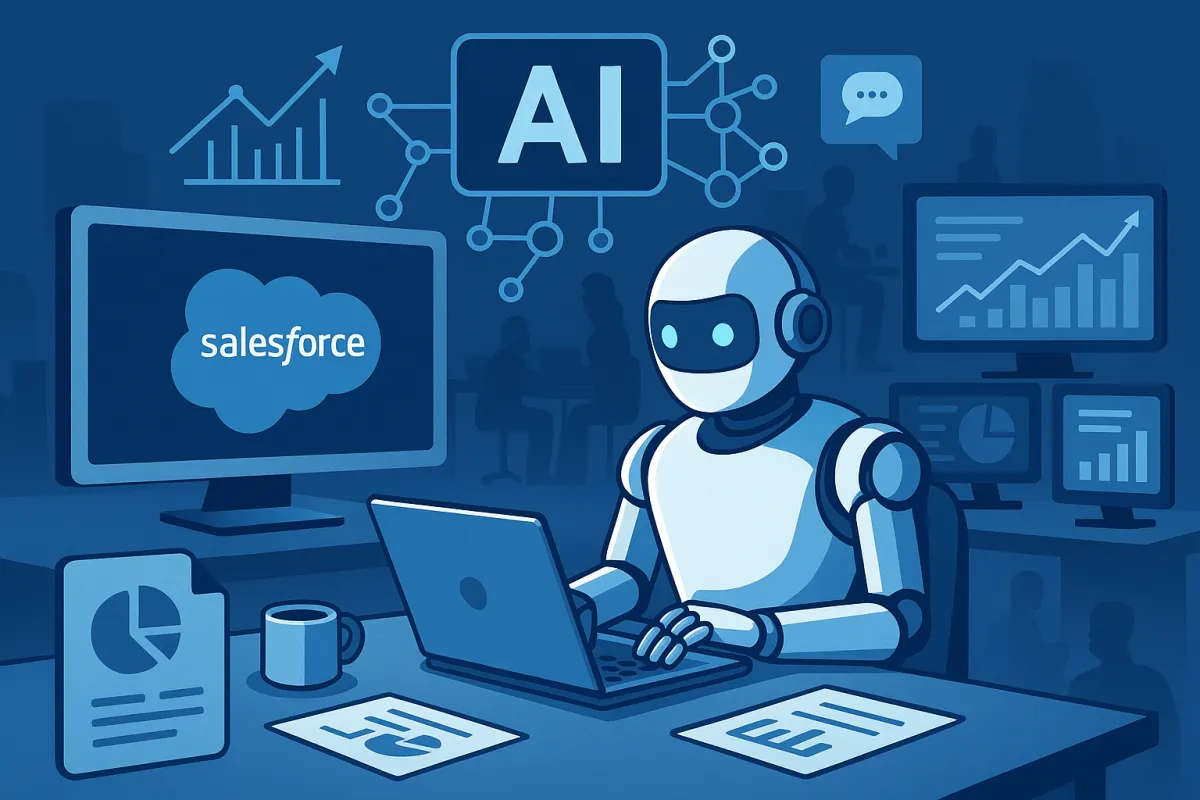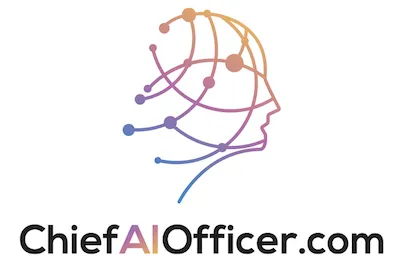
How Salesforce Got AI to Handle 50% of Their Work
How Salesforce Got AI to Handle 50% of Their Work
Artificial intelligence now handles between 30% and 50% of the total workload at Salesforce, according to CEO Marc Benioff. This significant integration spans software engineering, coding, customer service, analytics, marketing, and sales tasks, representing one of the most comprehensive AI transformations in enterprise technology.
While most executives debate AI implementation strategies and worry about change management, Salesforce has already restructured their entire operation around AI capabilities. They're not testing AI potential—they're documenting AI results across half their business operations with 93% accuracy rates.
This isn't a technology adoption story. This is a blueprint for the "digital labor revolution" that separates market leaders from companies that will become competitively obsolete.
The 50% Workload Transformation
Marc Benioff confirmed in multiple interviews that AI currently handles up to half of Salesforce's operations, covering engineering, coding, customer support, data analysis, personalized marketing, and strategic business functions.
The 50% workload integration demonstrates AI implementation scale that most companies consider theoretical rather than operational reality. When half of enterprise operations run on AI, organizational capabilities transform fundamentally rather than incrementally.
Companies that approach AI through departmental pilot programs will find themselves competing against organizations where AI handles the majority of business operations with superior speed, accuracy, and consistency.
The 93% Accuracy Achievement
Salesforce's AI systems achieve approximately 93% accuracy in their tasks across diverse business functions, though Benioff notes that 100% accuracy expectations are unrealistic for complex enterprise operations.
The 93% accuracy rate represents AI performance that exceeds human accuracy for many routine business tasks while enabling scale and consistency that human workers cannot match across enterprise operations.
Organizations that delay AI implementation due to perfection expectations will find themselves permanently behind companies that achieve superior results through 93% AI accuracy compared to traditional human performance variability.
The Digital Labor Revolution Strategy
Benioff describes Salesforce's transformation as part of a broader "digital labor revolution" where AI agents take on routine and repetitive tasks, allowing human employees to focus on higher-value, strategic work.
The digital labor strategy demonstrates how successful AI implementation redefines work rather than just automating existing processes. AI agents become digital workers that complement human capabilities rather than simply improving traditional operational efficiency.
Companies that approach AI as process improvement tool miss opportunities for workforce transformation that digital labor revolution provides through comprehensive operational restructuring around AI capabilities.
The Workforce Restructuring Reality
Salesforce's AI adoption has led to workforce restructuring including over 1,000 employee layoffs and redeployment of staff into new roles, with hiring slowing as AI assumes more operational responsibilities.
The workforce restructuring reveals how comprehensive AI implementation creates organizational change that extends beyond efficiency improvements to fundamental employment and operational structure transformation.
Organizations that implement AI without addressing workforce implications will face greater resistance and operational disruption compared to companies that proactively manage workforce transition during AI transformation.
The Function Integration Scope
AI automation spans engineering, coding, customer support, data analysis, personalized marketing, sales operations, and strategic business functions rather than limiting implementation to isolated departmental applications.
The integration scope demonstrates how enterprise AI transformation requires comprehensive deployment across all business functions rather than selective implementation that maintains traditional operational limitations.
Companies that limit AI deployment to specific departments miss opportunities for enterprise-wide competitive advantages that comprehensive AI integration provides across entire organizational operations.
The Billion Agent Ambition
Salesforce aims to deploy one billion AI agents by the end of 2025, demonstrating strategic commitment to AI scaling that extends beyond current operational improvements to market ecosystem transformation.
The billion agent target reveals how AI leaders approach transformation through ecosystem scaling rather than internal optimization alone. AI agent deployment creates market platform advantages that traditional competitors cannot match.
Organizations that focus AI implementation on internal operations miss opportunities for market platform creation that AI agent ecosystems provide through comprehensive customer and partner integration.
The Strategic Timing Advantage
Salesforce's comprehensive AI implementation creates timing advantages over competitors who continue debating AI strategy while Salesforce documents AI operational results across enterprise functions.
The timing advantage demonstrates how early AI adoption creates competitive positioning that compounds over time as AI capabilities improve and organizational expertise deepens through operational experience.
Companies that delay comprehensive AI implementation will find competitive gaps too large to close through traditional business improvements once AI leaders establish dominant operational capabilities.
The Operational Accuracy Standards
Salesforce's 93% AI accuracy across diverse business functions establishes operational standards that traditional human performance cannot consistently match at enterprise scale and speed requirements.
The accuracy standards reveal how AI implementation creates performance capabilities that become new baseline requirements for competitive operations rather than optional efficiency improvements.
Organizations that maintain traditional operational approaches will find themselves unable to meet accuracy and performance standards that AI-enhanced competitors establish as market requirements.
The Enterprise Scale Implementation
Salesforce's 30-50% AI workload integration across global operations demonstrates enterprise scale implementation that most companies haven't attempted across their organizational functions.
The scale implementation proves that comprehensive AI transformation achieves results that departmental pilot programs cannot deliver when enterprise commitment aligns with execution capabilities.
Companies that approach AI through limited testing miss opportunities for enterprise transformation that comprehensive implementation provides through organizational capability enhancement.
The Market Leadership Position
Salesforce's AI transformation establishes market leadership position that influences customer expectations, competitive requirements, and industry standards for enterprise technology operations.
The leadership position demonstrates how comprehensive AI implementation creates market influence that extends beyond direct operational benefits to industry transformation and competitive dynamic changes.
Organizations that delay AI transformation will find themselves following rather than leading market evolution while early adopters establish competitive advantages that reshape entire industry expectations.
The Customer Service Revolution
AI handles significant portions of Salesforce's customer service operations, creating service capabilities that traditional support approaches cannot match for scale, consistency, and availability.
The service revolution demonstrates how AI creates customer experience advantages that become competitive differentiators when service quality and availability exceed traditional operational capabilities.
Companies that maintain traditional customer service approaches will find themselves unable to compete with AI-enhanced service operations that provide superior customer experiences at enterprise scale.
The Engineering Automation Impact
AI handles substantial portions of software engineering and coding tasks, enabling development capabilities that traditional programming approaches cannot achieve at comparable speed and consistency.
The engineering automation reveals how AI transforms technical operations by eliminating routine development tasks while enabling human developers to focus on strategic architecture and innovation challenges.
Organizations that maintain traditional development approaches will find themselves unable to compete with AI-enhanced engineering teams that achieve superior development speed and code quality.
The Analytics Enhancement Capability
AI automation of data analysis and business intelligence enables analytical capabilities that traditional approaches cannot provide for speed, accuracy, and insight generation across enterprise operations.
The analytics enhancement demonstrates how AI creates decision-making advantages through data processing capabilities that exceed human analytical capacity while providing real-time insights for strategic planning.
Companies that rely on traditional analytics approaches will find themselves making decisions with incomplete information while AI-enhanced competitors operate with comprehensive real-time business intelligence.
The Marketing Personalization Revolution
AI enables personalized marketing capabilities that traditional approaches cannot achieve for customer segmentation, content customization, and campaign optimization across enterprise customer bases.
The personalization revolution creates customer engagement advantages through marketing precision that exceeds traditional campaign effectiveness while reducing operational costs and resource requirements.
Organizations that maintain traditional marketing approaches will find themselves unable to compete with AI-enhanced marketing operations that deliver superior customer targeting and engagement results.
The Sales Optimization Transformation
AI automation of sales processes creates sales capabilities that traditional approaches cannot match for lead qualification, opportunity scoring, and customer relationship management.
The sales transformation demonstrates how AI enables sales performance that exceeds traditional sales team capabilities through data-driven prospect identification and relationship optimization.
Companies that maintain traditional sales approaches will find themselves unable to compete with AI-enhanced sales operations that achieve superior conversion rates and customer acquisition efficiency.
The Strategic Investment Philosophy
Salesforce's comprehensive AI investment represents strategic philosophy that prioritizes competitive advantage creation over traditional operational efficiency improvements alone.
The investment philosophy demonstrates how market leaders approach AI transformation as fundamental business strategy rather than cost reduction initiative with limited strategic impact.
Organizations that limit AI investment to efficiency improvements miss opportunities for competitive advantage creation that comprehensive AI transformation provides through enhanced capabilities.
The Innovation Leadership Model
Salesforce's AI implementation establishes innovation leadership that influences industry standards, customer expectations, and competitive requirements across enterprise technology markets.
The leadership model reveals how comprehensive AI transformation creates market positioning advantages that extend beyond operational benefits to industry influence and strategic partnership opportunities.
Companies that delay AI transformation will find themselves following industry trends rather than leading market evolution while AI pioneers establish dominant competitive positions.
The Competitive Moat Creation
Salesforce's AI capabilities create multiple competitive moats including superior operational efficiency, enhanced customer service, better analytics, improved marketing effectiveness, and stronger sales performance.
These competitive moats reinforce each other to create sustainable market advantages that traditional competitors cannot easily replicate through conventional business improvements.
Organizations that delay comprehensive AI implementation will find competitive gaps too large to close through traditional operational enhancements once AI leaders establish dominant market positions.
The Future Business Reality
Salesforce's AI transformation establishes business reality where AI capabilities become essential requirements for competitive operations rather than optional efficiency improvements.
The future reality reveals why AI transformation requires immediate comprehensive action rather than gradual experimentation that delays competitive advantage capture while AI leaders establish market dominance.
The choice facing every executive is whether to begin comprehensive AI transformation that creates sustainable competitive advantages or continue traditional approaches while AI-enhanced competitors establish insurmountable operational capabilities.
The Executive Decision Framework
Salesforce's AI implementation provides decision framework that executive teams across all industries can adapt for their own competitive circumstances and operational requirements.
The framework prioritizes comprehensive deployment over pilot programs, operational transformation over efficiency improvements, and competitive advantage creation over cost reduction alone.
Organizations that apply similar frameworks will achieve AI transformation success while companies that focus on traditional change management will struggle to compete with AI-enhanced market leaders.
The evidence is overwhelming: AI handles half of Salesforce's work with 93% accuracy while creating competitive advantages that traditional approaches cannot match. The strategic choice facing every executive team is whether to commit to similar AI transformation or accept permanent competitive disadvantage.

